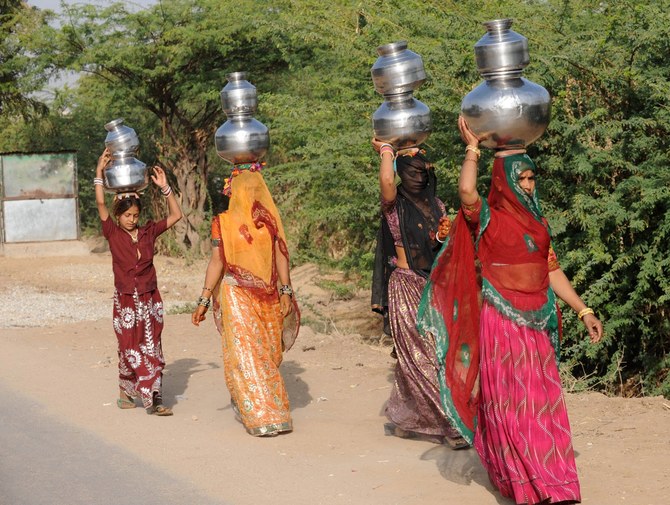
Few may have noticed, but last Sunday was International Day of Rural Women, while the following two days were also related to rural women and their lives: World Food Day and International Day for the Eradication of Poverty.
Unfortunately, though they constitute about 25 percent of the world’s population, numbering more than 2 billion, more often than not rural women remain in obscurity, missing from the headlines as well as from social welfare programs, leading to a situation where they seem to have received the short end of the stick in every sphere of life. Even data collation on rural women remains patchy, with few organizations having access to comprehensive and up-to-date information about rural women and their socioeconomic and political profiles.
The little data that is available is scary enough. Only 2 percent of rural women complete upper secondary school and 50 percent are married off as children. Women make up only 15 percent of all landowners, even though 64 percent of women in low-income nations work on farms. Rural women spend more than 200 million hours every day just fetching water for their families. Of 189 countries surveyed by the UN, 104 have laws that prevent women from working in some sectors and, in 18, husbands can legally prevent them from working. Women in general and rural women in particular also lack financial independence and hundreds of millions of them lack access to formal banking.
They also lack access to proper nutrition, healthcare and other civic amenities that most of us take for granted. The last three years have been especially hard on rural women due to the outbreak of the COVID-19 pandemic, as well as record food inflation and the resultant nutritional crisis that has hit large parts of developing societies. Being mainly employed in farming, the increasing vagaries of climate change due to global warming have definitely hit rural women in the worst possible manner.
What is needed is a holistic approach, in which each rural woman or girl is tracked throughout their life
Ranvir S. Nayar
In some countries, there are social welfare programs that cover rural women, whether in terms of nutritional advice, food packets or stamps, or access to basic healthcare and education. But the biggest challenge here is the multiplicity of government departments and international and local nongovernmental organizations that are involved in carrying out very specific projects, only touching one aspect or part of a limited community. This approach, while being focused on specific actions, obscures the overall situation.
What is needed is a holistic approach, ideally nationwide for smaller countries or statewide for bigger nations, in which each rural woman or girl is tracked throughout their life, starting from birth, to ensure they do not miss out on any vaccinations or other needed medical or nutritional inputs. Medically, it is proven that a woman who is deprived of proper nutrition as a child goes on to give birth to children that are more prone to be underweight and/or stunted.
Similarly, proper attention should be paid to rural girls’ education and creating opportunities and platforms for them to be as well equipped for any job role as the male children of the richest quintile of the population. This would require the creation of well-equipped and well-managed schools and colleges in villages themselves as, in most developing countries, societal pressures bar girls from leaving their villages to study, even as day scholars. It may also necessitate the setting up of girls-only educational facilities to ensure that girls are not deprived of education due to societal taboos.
Proper education also means access to all the tools, including computers and the internet, which have become integral to school life today. It is imperative that these tools are provided, since there is a huge digital divide between the rural and urban worlds, which becomes even sharper when it comes to girls or women. This requires not only equipping them with the proper devices but also imparting training on how to use them.
Similarly, in terms of employment opportunities, there should be proper incentives to ensure that employers actively seek out rural women and, where needed, disincentives for those failing to do so. It is also necessary to ensure there are adequate employment opportunities in the vicinity of their homes, since travel is often not feasible.
In terms of work, there should be proper incentives to ensure that employers actively seek out rural women
Ranvir S. Nayar
A lot, if not all, of these problems can be solved through technology, with most nations, notably India, moving toward digital governance and delivering many services on the basis of a digitalized unique identity number. So, with the proper use of technology that is already widespread, it is possible to track a child’s health, vaccination status, nutrition and development into adulthood. This tracking can also be continued to ensure that rural girls receive everything needed to develop into strong, well-educated, confident and independent women, who would in turn be able to ensure that other women and girls receive all they need.
Besides education, health and nutrition, technology is handy today in terms of employment, as a huge number of jobs can be done from home or remotely, away from a centralized office or factory. Governments should push employers to create such opportunities in adequate numbers.
In some places, laws need to be changed, most notably relating to ownership rights, such as in terms of inheritance. Laws might also need to be put in place to ensure that women farmers also get ownership rights, instead of being obliged to transfer them to a male member of their family. If economic input is needed, then governments ought to help all-women self-help groups, of which there are now plenty across the world, to at least allow cooperative land ownership, if not individual.
Women also need adequate political representation to ensure that they are involved in decision-making processes. There is enough evidence out there to state that, when women are involved in making decisions, they take care of basic issues like drinking water, waste management, access to energy, and health and nutrition.
Everything that is needed to radically alter the fate of rural women already exists. The only thing missing, perhaps, is political will. Unless this is witnessed in adequate strength, it is unlikely that rural women will be able to get at least on par with the rest of humanity. Ultimately, keeping more than 20 percent of humanity away from these basic amenities will ensure that the world misses all of the UN Sustainable Development Goals.
Ranvir S. Nayar is managing editor of Media India Group.












